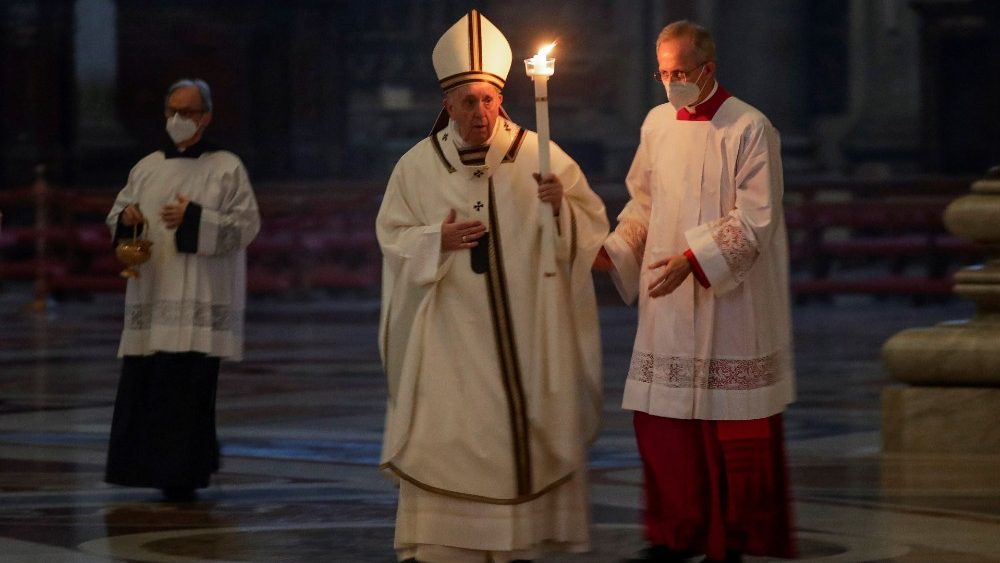The patience. This is the word around which Pope Francis has guided his homily today, during the Holy Mass dedicated to the 25th World Day for Consecrated Life. The Pope has cited the patience of Simeon as an example to demonstrate to members of Institutes of Consecrated Life and the Society of Apostolic Life that there are three “places” where patience takes concrete form.
The patience of Simeon
“Let us attentively observe the patience of Simeon – says the Pope – who throughout his life waited and exercised the patience of the heart.” Francis assures us that Simeon took patience “in prayer,” “for he learned that God does not come in extraordinary events, but that He accomplishes His work in the apparent monotony of our days, in the sometimes exhausting rhythm of activities, in the small and insignificant things we do with perseverance and humility, trying to do His will.” Moreover – he adds – “walking with patience, Simeon was not worn down by the passage of time. He was already an old man, yet the flame of his heart continued to burn; in his long life he may have been wounded and disappointed at times; nevertheless, he did not lose hope. With patience, he kept the promise, without letting himself be consumed by the bitterness of the past or by that resigned melancholy that arises when one reaches the sunset of life.”
Patience leads to conversion
But – asks the Pope – “Where did Simeon learn this patience?” “He received it from prayer and from the life of his people, who in the Lord had always recognized the ‘merciful and compassionate God, slow to anger and rich in love and faithfulness,’” “the Father – he continues – who, even in the face of rejection and infidelity, does not tire and grants again and again the possibility of conversion.” Therefore, for Pope Francis, Simeon’s patience is “a reflection of God’s patience,” and with His patience “He leads us to conversion and teaches us resilience.”
What is patience according to Francis?
What is patience? Pope Francis has answered this question: “It is not mere tolerance of difficulties or a fatalistic resistance to adversity. Patience is not a sign of weakness: it is the strength of spirit that makes us capable of ‘bearing the weight’ of personal and communal problems, it makes us embrace the diversity of others, it makes us persevere in good even when everything seems useless, it keeps us moving even when boredom and laziness attack us.”
The three “places” where patience takes concrete form
The Pontiff, after citing the example of Simeon, explained to members of Institutes of Consecrated Life the three occasions in which they must have patience: in personal life, in community life, and before the world, for as he assured, “patience helps us to look at ourselves, our communities, and the world with mercy. These are challenges for our consecrated life: we cannot dwell in nostalgia for the past nor limit ourselves to repeating the same old things. We need the courageous patience to walk, explore new paths, and seek what the Holy Spirit suggests to us.”
In our personal life
“Sometimes, the enthusiasm for our work does not match the results we expected, our sowing does not seem to produce the right fruit, the fervor of prayer weakens, and we are no longer immune to spiritual dryness,” said the Pontiff. With these words, he wanted to remind us that although in the life of consecrated persons hope can wear out due to disappointed expectations, we must be “patient with ourselves” and “trustingly wait for God’s times and ways: He is faithful to His promises.”
“Remembering this – he said – allows us to rethink our paths and revitalize our dreams, without giving in to inner sadness and disillusionment,” for, “inner sadness in us consecrated persons is like a worm that eats us from within, flee from inner sadness.”
In community life
Regarding human relationships, especially when sharing a life project and an apostolic activity, Francis assures us that “they are not always peaceful”: “Sometimes conflicts arise, and we cannot demand an immediate solution, nor should we rush to judge the person or the situation: we must know how to keep our distance, try not to lose peace, wait for the best moment to clarify with charity and truth.” Moreover – he says – “they should not be confused with storms, for we can never make good discernment in life if our heart is agitated.” In our communities – he continues – “we need mutual patience, that is, to bear and carry on our shoulders the life of our brother or sister, even their weaknesses and faults.” A piece of advice from the Pope to never forget this is that “the Lord does not call us to be soloists, but to be part of a choir, which sometimes is out of tune, but always tries to sing united.”
Patience before the world
Finally, the Pope speaks of patience before the world and again cites Simeon and Anna, who cultivated in their hearts the hope announced by the prophets, although it took time to become a reality and grew slowly amid infidelities and ruins of the world. “We need this patience so as not to become prisoners of complaint: ‘the world no longer listens to us,’ ‘we have no more vocations,’ ‘we live in difficult times’… Sometimes it happens that we oppose the patience with which God works the terrain of history and our hearts with the impatience of those who judge everything immediately, and thus – he concludes – we lose the most beautiful virtue: hope. So many consecrated persons lose hope because of impatience.”
Two pieces of advice from the Pope to the consecrated
At the end of the Eucharist, Pope Francis gave two pieces of advice to consecrated men and women: bite your tongue and have a sense of humor: “Avoid gossip, what kills community life are gossip, do not speak about others. There is a medicine very close to home: biting your tongue,” said Francis. And then, the other advice he recommends for community life: “do not lose your sense of humor, it helps us so much, it’s the anti-gossip, knowing how to laugh at ourselves, at situations, and also a little at others, but not losing the sense of humor. What I recommend is not a very clerical advice, but very human.”










